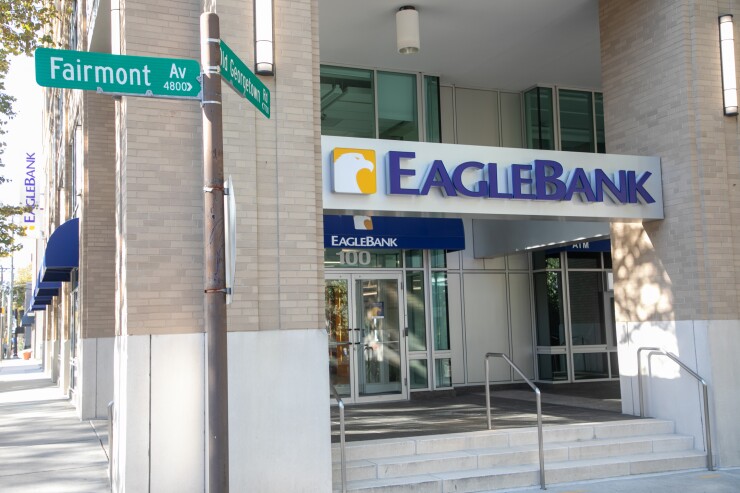
Eagle Bancorp in Bethesda, Maryland, snapped a two-quarter losing streak and posted a third-quarter profit. But the bank's executives said their turnaround effort — which includes a dividend cut to preserve capital — is still in its early stages.
During the third quarter,
Eagle intends to reduce its commercial real estate concentration at a time when corners of that sector are struggling.
"I am confident in our strategy and approach,"
She said the recent capital raise included "full participation from executive management and the board," with the bank's leaders collectively investing $3.9 million, or about 5% of the total issuance. "The raise demonstrates the confidence investors have in our vision and in the future of our company."
Eagle reported net income of $21.8 million, or 72 cents per share, for the third quarter. That compared with a net loss of $83.8 million, or $2.78 per share, for the second quarter, and net income of $27.4 million, or 91 cents per share, for the third quarter of 2023.
The second-quarter loss was driven by a $104.2 million goodwill impairment. The bank also reported a net loss of $338,000 for the first quarter after recording a $35.2 million provision for credit losses tied to an office property in Washington, D.C.
Commercial real estate loans make up about two-thirds of the bank's loan portfolio. Office CRE is under pressure after remote work trends and population losses from urban cores spurred increases in vacancy rates and hindered landlords' collective ability to make loan payments. In Washington — a key segment of Eagle's footprint — the federal government and businesses that work with government agencies have reduced office square footage.
Multifamily, retail and other CRE loans also have struggled under the weight of inflation and high interest rates over the past two years.
Eagle's nonperforming assets increased by $38.2 million in the third quarter, reaching 1.22% of total assets. That was up from 0.88% in the prior quarter and was largely driven by the reclassification of both $27.3 million of mixed-use land loans and a $17.9 million assisted living facility loan, the bank said.
The industry overall reported that NPAs were 0.52% of total assets for the second quarter, according to S&P Global Market Intelligence.
At Eagle, net charge-offs for the third quarter totaled $5.3 million, up from $2.3 million in the prior quarter and $340,000 a year earlier.
John "Johnny" Allison, the outspoken chairman and CEO of Arkansas-based Home BancShares, used the company's third-quarter earnings call to endorse the Republican presidential nominee. When asked about that decision, he got confrontational.
"Valuation risks have driven our charge-off activity from our office portfolio, and that risk is largest in the central business district" of the nation's capital, "where we have only four loans," Chief Credit Officer Janice Williams said on the call. "Our Northern Virginia and Maryland office exposure has not seen the same degree of valuation challenges to date. We are not seeing any material shift in the performance of our multifamily portfolio.
"When I look at what's been foreclosed on in our market, and I think this is probably true across the country, large loans in the central business district are the ones that are seeing the biggest drop in valuation. And there's a very limited number of buyers for those properties, very limited financing for anyone who is a buyer on those properties," Williams added. "We're starting to see some green shoots of activity in the market, but I think that the volatility in appraisals, while it should be improving, will take a while to shake out."
Riel said that, after the Federal Reserve cut its benchmark
At the same time, lower borrowing costs could boost C&I loan demand in coming quarters. As Eagle grows its C&I base, it expects to gradually bring on deposits from those customers at lower rates.
Keefe, Bruyette & Woods analyst Catherine Mealor said in a report that she was "encouraged" by Eagle's credit outlook, though she noted the increase in nonperforming assets in the third quarter as a source of near-term concern.
Eagle's third-quarter deposits totaled $8.5 billion, up 3% from the prior quarter. The increase was primarily driven by expanded digital banking services, Eagle said.
Total loans of $8 billion were essentially flat with the prior quarter — with CRE loans nearly even — though the bank grew its portfolio by about 1% from a year earlier.
Third-quarter net interest income of $71.8 million was up slightly from the prior quarter and up 1.5% from a year earlier. The bank's net interest margin decreased three basis points during the quarter to 2.37% due to higher deposit costs.
Noninterest income of $6.95 million for the third quarter was up 30% from the prior quarter and up 10% from a year earlier. The bank attributed the improvement to higher swap fee income.






